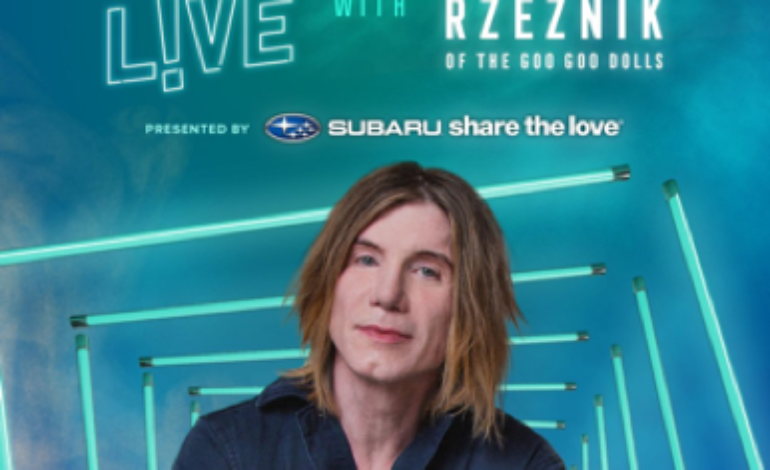

Rzeznik appeared for a livestreamed iHeartRadio set that ran just under the advertised 1 hour time. As the Goo Goo Dolls frontman, a solo acoustic performance was a mild surprise, as Rzeznik stood center stage and performed most songs with no accompaniment. The only exception was the support of a keyboard player behind him for a few songs.
The iHeartRadio venue was medium sized with two floors and a glass box, reminiscent of the Troubadour, with the audience split between a general area by the stage and a second floor seating area. It appeared that the iHeartRadio team sat inside glass box, working on the technical elements of the show. John Rzeznik’s performance seemed to translate smoothly to a purely audio setting.
John Rzeznik had a great stage presence. He gave off a positive, relaxed energy and nuance played a key role in the spirit. For example, the stories he was willing to share required a vulnerability that contributes to a choice of being an everyman, equivalent to sharing a song in a living room with a friend.
He clearly had a youthful spirit as well. With his smile that seemed to last the entire show, and as happy an expression one can have while still singing engaged. He seemed to invite the listener in.
For many musicians, real content and pure sound isn’t always correlated. For example, there are some who play many notes to fill space or show off but after the song is over, leave very little of the audience asking for more or carrying a lasting impression. On the other hand there are artists with a single acoustic guitar and simple lyricism that make a lasting impression and get the audience longing for another song. Rzeznik is somewhere in between; he played tastefully on the guitar instead of flashily. At the same time, his lyrics were classic pop (which he clearly excels at) but as mentioned before, aspired on occasion to deeper art. The end result is something that might be considered a reasonably strong and deep impression for a pop act.
One interesting test of a musician live is to see how their music stands up purely on audio, blocking any visual bias (dress, mannerisms etc.). Rzeznik passes this test well primarily due to the purity of his voice and guitar, which likely comes from experience. Given that he’s primarily a bandleader and not a solo artist, it is commendable for a major pop act to be able to stand alone and influence an audience purely through a tight vocal and guitar performance.
For an artist seemingly from another generation, the iHeartRadio performance was filled with an enthusiastic crowd, with great diversity in terms of age. Rzeznik himself acknowledged his age and the peculiar scene of a 90’s star frontman performing in a venue that often features the most up-to-date pop artists, thanking the venue for allowing an “old guy” to perform.
The show featured Rzeznik both alone with his acoustic guitar and with a backing keyboard player. Particularly by the end of the show, the addition of the keyboard player created a more sonically unique experience, given how common it has been in American music for decades for any performance short of featuring a full band to instead resort to only one acoustic guitar.
The sound of Rzeznik’s acoustic guitar by the end of the show did come off as slightly tinny, though it is hard to say how much of it was a result of the venue’s sound system, the way Rzeznik was playing the guitar, or the particular guitars he was playing (he switched between them for different songs).
Regardless of the sound of the guitar, the acoustic format can often be taken as a genuine test of songwriting ability, style and aspirations. Though perhaps best known for the hit “Iris,” this venue allowed Rzeznik to briefly introduce and perform some more ambitious songs that might have been too complex to push as a single but offered more depth for the intimate audience. For example, he introduced the song “Broadway” as about growing up as an underdog in a tough neighborhood, being “beat up” by the neighborhood bullies and then coming home to be beat up by his sisters (half-jokingly.)
There is also a youthful spirit about Rzeznik, as noticeable in his lighthearted banter with the audience, again many of which were surprisingly younger. His own interviews referencing younger artists like Valerie Broussard and showing a clear interest in current musical trends is also not always the case with older musicians.
John Rzeznik appears to sit at an interesting musical intersection, apparently growing up listening to classic rock bands like the Kinks and punk rockers like the Clash, though their style is less recognizable in his own music. This is juxtaposed with recent interviews where Rzeznik has listed Grace Vanderwaal, the young songwriter known for her ukulele self accompaniment, as a dream collaboration. This range of interests however, isn’t altogether surprising, given that even his own acoustic set featured obviously pop sensibilities but occasional elements of depth beyond the clearly commercial.
There is something about Rzeznik that seems to attempt to connect and be transparent, quite the opposite of a Bob Dylan like mysteriousness. Whereas old school artists and cultural icons seem to care more about “getting in and getting out” and fostering demand through restricting supply, he seems to be very open with many details of his life, including the mundane. For example, he shared in an interview that he was still taking vocal lessons.
As much as his obvious ability, his personality and warm rapport with the audience made the show a strong showing from him and experience for the audience.
